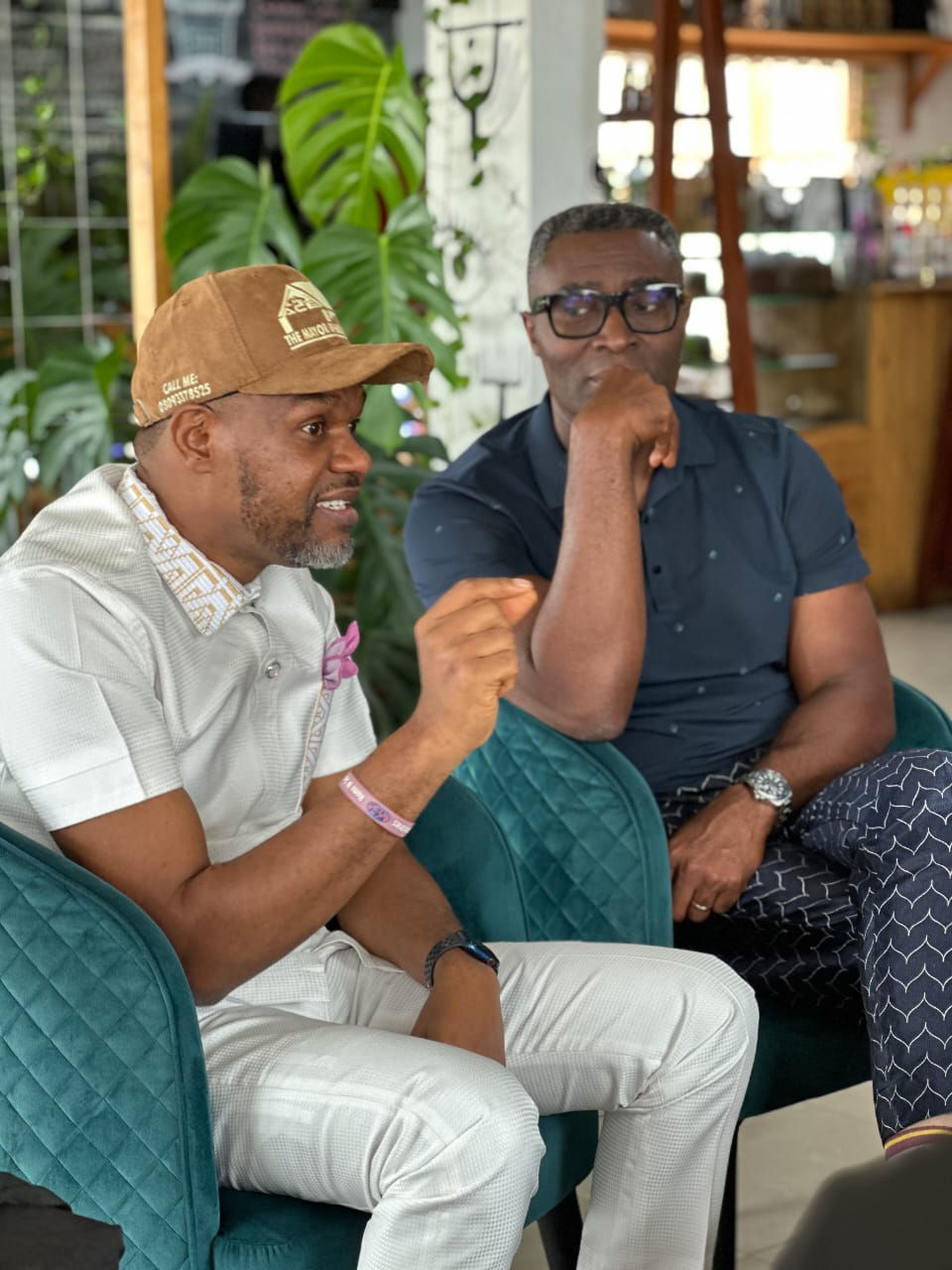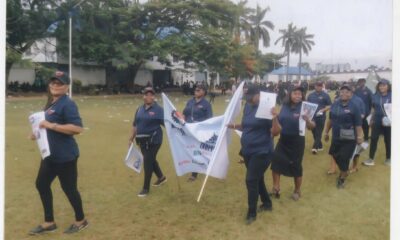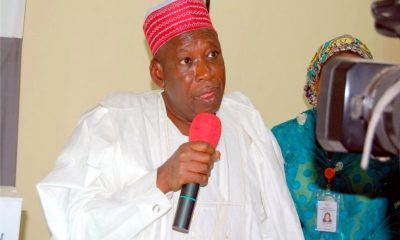News
Rivers Tourism Agency, Mayor of Housing Seal Deal After Economic Summit

…..Set to Restore Rivers Leadership Status In Tourism, Entertainment
The Rivers State Tourism Development Agency (RSTDA) has sealed partnership deal with the Mayor of Housing to boost tourism and entertainment.
This is aimed at rebooting the economy of the state as the state government seeks to boost ease of doing business (EoDB).
The partnership was sealed after the Rivers State Economic and Investment Summit which ended on May 23, 2024.
The partnership was unveiled at an event at the GRA where the Director-General (DG) of the RSTDA, Mr Yibo Koko, gave details of what he called the low hanging fruits initiative to tap into obvious advantages.
He presented the Mayor of Housing, My-Ace China, the CEO of the Housing and Construction Limited, who has demonstrated capacity and willingness to join in the task.
It was gathered that some banks have also indicated interest in partnering with the Agency to achieve the objective of Sir Sim Fubara’s administration in the Tourism sub-sector.
It was gathered that tourism alone can restart the economy, based on what worked for the state in years past when the city led other states and cities in entertainment and tourism.
The new role of the RSTDA seemed to have been rediscovered at the economic summit and fresh mandates with marching orders may have been issued.
The DG of the Rivers State Tourism Development Agency (RSTDA) spoke glowingly about the gains of the Rivers State Economic Summit and the Creative Art, saying the Mayor of Housing was part of the panel on creative economy and his participation led to the decision to go back and start from the ‘Low Hanging Fruits Initiative’.
He said Gov Fubara’s body language suggests positivity and this has led to trickling effects on creative economy and the young people.
He gave insight into how reputations are ruined online, saying Algorithm or Artificial Intelligence (AI) picks what comes online most frequently and uses it to characterize a person or place for profiling.
“So, when people click on your name, what comes up is the thing AI says you are. For Rivers State, it’s the steady bad news in the media that AI picks to brand the state.
“The RSTDA wants to reverse that and we want the many good things happening in the state to be brought up deliberately.
“The state government wants entrepreneurs and investors to be the ones driving wealth creation and the growth of the economy. We want to bring back the vibrancy of the Garden City and we know the role tourism and entertainment can play.”
He took time to articulate what constitutes the low hanging fruits and how the RSTDA planned to harvest them with support from partners, especially the Mayor of Housing.
Speaking, the Mayor of Housing (My-ACE China) expressed delight working with the RSTDA.
He said: “I started estate business in Abuja. In 2021, we wanted to extend to Port Harcourt, but the first thing the CEO of our company then told me was all about insecurity in the Garden City and all the associated hypes.
“He asked me how I would need over five Mopol (Military Police Operatives) to move about in Port Harcourt. The narrative then was that Port Harcourt was unstable and unsafe. We argued and agreed I would be the one to go, and if I was killed, he would stay away.
“Coming into Port Harcourt at last, I was shocked at the peace and stability, at the hospitality, at the liveliness, cuisine, housing potentials, etc.
“In housing, we were more than 100 brands in Abuja hustling for space, but I came into Port Harcourt and saw only two active brands. It was like I could beat them ad be the topmost.
“I called my people and said, this is a deep market. I staged the biggest event in Port Harcourt. It was shocking. People came out because of the shouting I did.
“This was the same Port Harcourt they said would swallow me.
|When I went into the nitty-gritty of doing business in Port Harcourt, I found why the narrative was looking gloomy.”
He said there was a political dilution of people’s goodwill and most persons in the state were victims, including top people doing so well.
“I discovered that there are very many unsung people here that felt they would not make it unless they went to Lagos.
“So, I chose the comedy industry to start the push to sell Port Harcourt with positive narrative and restart of the story of the city.I began to sponsor them with whatever little I had.
“I am the first corporate body to scale Corporate Social Responsibility (CSR) because others start CSR when they make it, but I started from the start or even before the start of my project.
According to him, as at this year, we have won ‘brand of the year’ for three years running just by doing little by little.”
“So, part of the fundamental things why we are here today is to tell everybody that the awareness and deliberate narrative change can start now and here; and we can begin to talk about the positives of Rivers State, we can skew the algorithm back in our favour.
“If Lagos State has 15 million people and they have less people talking about their potential, that would reduce visibility to the work of about three million people. Rivers with six million people need to work harder. If 50 per cent or more of our people talk about the positives of this state, it will beat that pattern or algorithm.
So, the idea is, who else will tell them. The good book said how will they hear, if somebody doesn’t preach to them. We thus put this meeting together so you can all preach the message of the positives of Rivers State.
“When this competition as outlined by the DG (of the RSTDA) begins, it would launch Rivers State back as the tourism capital of the world. By the story told by the DG, if the tourism promoters of Dubai could come to Port Harcourt to promote a show and only seven persons showed up, the small number was not because there was scarcity of talent or lack of interest from the youths of Rivers State, it was because of lack of narrative-pushing to tell the youths that there was opportunity somewhere.
“When I started my project in Alesa Eleme, I was told don’t go, they do worry. But today, I have not even started the project proper and I have got an award from the same Alesa Elele youths as ‘Hero of Development’ all because of little corporate social responsibility (CSR) things I did for them.
“It broke my heart when they came to me and said they could secure our facility. They said all we needed to give them were equipment and gears not costing up to N5m. We did that donation in December 2023 but I was weak when they said for 20 years, no company had donated those things.
“It is about the narrative being peddled around the state and around the communities. The story is not being told. If you don’t load the search engine with good stories, you won’t move up on the scale of attractive cities and investments.
“Let’s get to the level of knowing what to tell and what not to”, he said .
News
Bill For Compulsory Counselling For Convicted Corrupt Nigerians Scales Second Reading
A bill to amend the Corrupt Practices and Other Related Offences Act 2000 has passed its second reading in the House of Representatives.
The bill, which mandates compulsory counselling and training for individuals convicted of corruption-related offences, was sponsored by Kayode Akiolu (APC-Lagos) during plenary on Wednesday.
Leading the debate, Mr Akiolu explained that the bill sought to amend Section 67 of the principal act, introducing new provisions that were not part of the original section.
“These additional provisions, found in subsections 2, 3, and 4 of the amendment bill, require judges and magistrates to not only impose imprisonment and/or fines on those convicted of corruption but also mandate a minimum four-week anti-corruption counselling and training.
“The counselling and training will be designed and delivered by the Anti-Corruption Academy of Nigeria (ACAN) and aims to address the psychological factors related to corrupt behaviour,” Mr Akiolu said.
Mr Akiolu emphasised that the training would help reform convicts by addressing their corrupt tendencies and could even transform them into advocates for anti-corruption efforts.
He added that this approach aligned with the reformative aspect of the criminal justice system, which focused on punishment and rehabilitation.
“As per subsection 4, the bill allows magistrates and judges to order convicts to cover the cost of their counselling and training, preventing additional financial burdens on the government,” the lawmaker noted.
Mr Akiolu further argued that if the bill is passed into law, it would strengthen the country’s fight against corruption.
Given the widespread negative impact of corruption, he urged the House to support the bill for the country’s benefit.
Following the debate, Speaker Tajudeen Abbas referred the bill to the relevant committee for further legislative consideration.
News
Judiciary, Media Key Pillars Of Democracy, Says CJN

The Judiciary and the Media are key pillars of democracy, the Chief Justice of Nigeria (CJN), Justice Kudirat Kekere-Ekun, has said.
Kekere-Ekun made this statement in her address at the 2024 National Conference of the National Association of Judiciary Correspondents (NAJUC).
The CJN was represented by Mr Abdulaziz Olumo, the Secretary of the National Judicial Institute (NJI).
“ The judiciary and the media occupy unique and complementary roles in any democratic society.
“ The judiciary serves as the guardian of justice, equity, and the rule of law, the media acts as the conscience of society, disseminating information, shaping public opinion, and ensuring accountability.
“ Together, these institutions provide checks and balances that strengthen the fabric of democracy,” she said.
Quoting Felix Frankfurter, a former U.S. Supreme Court Justice, she said: free press is not to be preferred to an independent judiciary, nor an independent judiciary to a free press. Neither has primacy over the other; both are indispensable to a free society.”
The CJN said this dynamic interdependence between the judiciary and the media presents opportunities and challenges alike.
“ The media is entrusted with the responsibility of informing the public about judicial activities, the judiciary relies on accurate and ethical reportage to enhance public confidence in its work.
“ However, the inherent power of the media to influence public opinion requires careful management, especially when its focus turns to judicial proceedings.
“ The question posed by Robert J.Cordy, a former Associate Justice of the Massachusetts Supreme Judicial Court, is pertinent here: “What happens when the free press turns its sights on the courts-scrutinizing, sensationalizing, and exposing the frailties of the judiciary while questioning its ethical standards and performance?”
“The media’s capacity to shape narratives and perceptions is undeniable” she said.
Quoting Jim Morrison , she said “Whoever controls the media controls the mind.”
According to her, this underscores the immense responsibility placed on journalists to report truthfully, fairly, and objectively.
“ Unfortunately, the commercialisation of news and external influences have led to the rise of sensationalism-a practice that distorts facts, erodes trust, and undermines the very essence of journalism.
“ Sensationalised headlines, such as the infamous 2016 headline “We raided the houses of ‘corrupt, unholy’ judges, says DSS,” can paint a skewed picture of the judiciary and its officers. Such reporting, often devoid of context, compromises the integrity of the justice system and misleads the public.
“ Closely tied to this is the issue of “trial by media,” where premature and often biased media narratives prejudge cases and infringe on the constitutional rights of individuals” she said.
She added that as Mahatma Gandhi rightly observed, “The sole aim of journalism should be service.” It is imperative for media practitioners to remain steadfast in their commitment to truth and objectivity.
To this end, she advised, the National Association of Judiciary Correspondents to take proactive steps to regulate the activities of its members.
“ This is not merely about enforcing rules but about fostering professionalism and safeguarding the credibility of the media.
“ The judiciary and the media must work as partners in progress.
“ To bridge the gap between these institutions, there is a pressing need for constructive engagement and mutual understanding.
“ Courts can provide the media with guidelines on judicial processes, courtroom decorum, and the nuances of court proceedings.
She noted that globally, courts have adopted initiatives to support the media’s role in reporting judicial matters.
For instance, she said the Supreme Court of Dakota’s media guide outlines protocols for courtroom reporting, while the UK ‘s Media Guidance document provides clarity on access and etiquette for journalists.
“ These examples demonstrate how structured collaboration can enhance the quality of judicial reportage.
“ In Nigeria, we can take a cue from these models by developing a comprehensive media guide tailored to our judicial landscape.
“ This initiative, which would involve inputs from NAJUC and judicial stakeholders, would not only enhance media access to courtrooms but also ensure that judicial activities are accurately and responsibly reported” she said.
She advocated that judiciary correspondents must make deliberate efforts to familiarise themselves with the rules and procedures of the courts.
She added that understanding these frameworks will enable journalists to navigate the complexities of judicial proceedings effectively and responsibly.
“ Training programs such as this conference play a crucial role in equipping judiciary correspondents with the knowledge and skills needed to report judicial matters accurately.
“ The theme of this year’s conference, “The Role of Courts in Enforcement of Judgments,” is both timely and significant, as it addresses an aspect of judicial work that is critical to upholding the rule of law and ensuring justice.
“ I commend NAJUC for its commitment to promoting accountability and transparency through its engagements with the judiciary.
“ As I conclude, I must emphasize the importance of credible journalism in strengthening public trust in the judiciary” she said.
She urged judiciary correspondents to prioritise the pursuit of truth and objectivity, resist undue influences, and remain steadfast in their commitment to ethical standards.
She commended the leadership of NAJUC, under the chairmanship of Mr Kayode Lawal, for its efforts in promoting professionalism among judiciary correspondents.
News
Senate Issues Arrest Warrant Against Julius Berger MD Over Road Project

The Senate has issued an arrest warrant for the Managing Director of Julius Berger Nigeria Plc, Dr Peer Lubasch, to appear before its Committee on Works.
The Tide’s source reports that the warrant was for Lubasch to explain the utilisation of funds appropriated for the reconstruction work on Calabar-Odukpani-Itu highway.
The warrant followed the adoption of a motion sponsored by Sen. Osita Ngwu (PDP- Enugu) and co-sponsored by Sen. Asuquo Ekpenyong (APC-Cross River) and Sen. Mpigi Barinada (PDP- Rivers) at plenary in Abuja, yesterday.
Ngwu, in the motion said, that the senate had mandated the committee on works to conduct investigation into the state of road infrastructure across the country.
He said that in furtherance to the investigative hearings, Julius Berger refused to honour invitations to provide details of its role in the Calabar-Odukpani-Itu highway project, in spite of receiving substantial public funds.
He said that this was worrisome, given the alarming discrepancies in performance among contractors on the project, with specific reference to Julius Berger for failing to meet delivery timelines.
Ngwu said it was the constitutional powers of the National Assembly under Sections 8 and 89 of the 1999 Constitution, as amended, to conduct investigations on any person or organisation responsible for administering public funds.
He said that the powers set out in section 6 of the legislative powers and privileges act empowered the Senate to issue warrants of arrest on persons in contempt of its proceedings.
The Tide source reports that the senate further ruled that President of the Senate, Godswill Akpabio, should sign the warrant, mandating the Julius Berger managing director to appear on a date to be communicated.
Akpabio said that the senate’s decision was in line with its constitutional powers under Section 89 of the 1999 Constitution (as amended).
“This senate will not tolerate the continued disregard of its authority.
“The managing director of Julius Berger must appear before the relevant committee, failing which further actions will be taken as prescribed by the constitution.
“The point of order, which was supported by the majority of the senators, highlighted the importance of upholding the integrity of the legislature.
“The senate committee will submit its findings to the National Assembly after the MD’s appearance.
“If there is any further failure to comply, we shall take the necessary steps to ensure respect for the constitution and the rule of law,” Akpabio said.
-

 News2 days ago
News2 days agoForge Unity For Progress, Fubara Urges Nigerian Youths …Accepts Beacon Of Hope Award
-
Politics2 days ago
Inclusivity: Chief Whip Makes Case For Women
-
Sports2 days ago
Subsea Cycling Club Chairman Solicits For Support
-
Nation2 days ago
Director Tasks ICAD Members On Professionalism
-
Rivers2 days ago
Ministry Debunks Akpana’s Leadership Of JONAPWD … Sets Stage for Peaceful Election
-

 Editorial2 days ago
Editorial2 days agoA New Dawn For Rivers’ Workers
-

 Business2 days ago
Business2 days agoNADF, NASC Partner To Boost Food Security
-

 Politics2 days ago
Politics2 days agoGanduje Gets February 13 Date For Hearing In Alleged Bribery Trial

